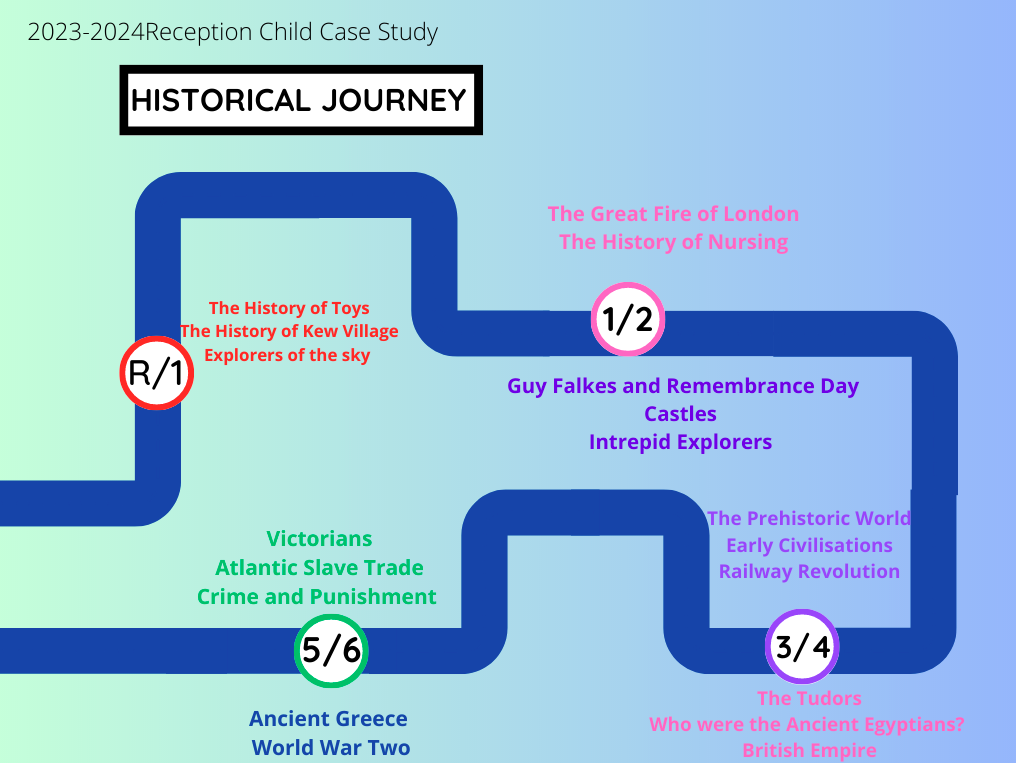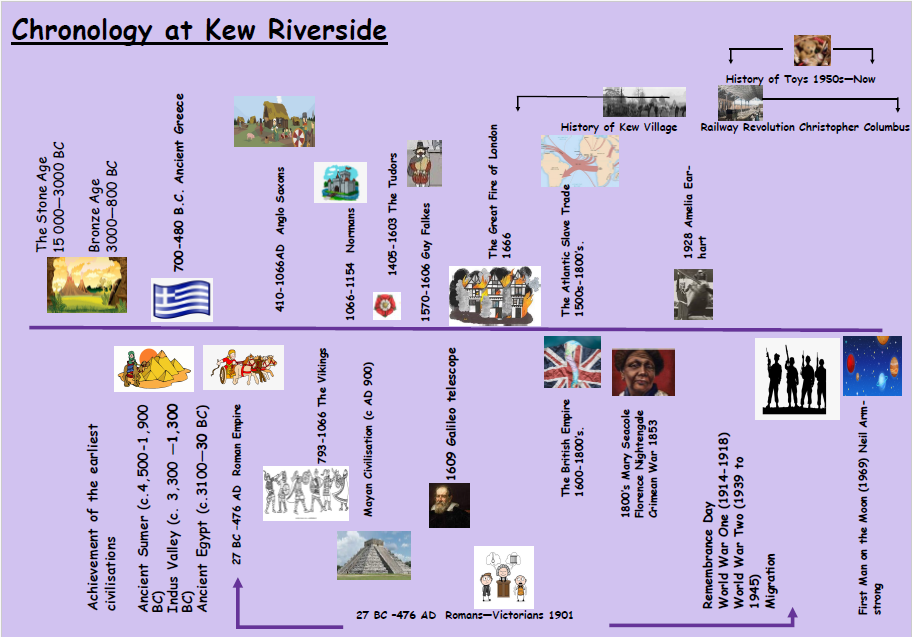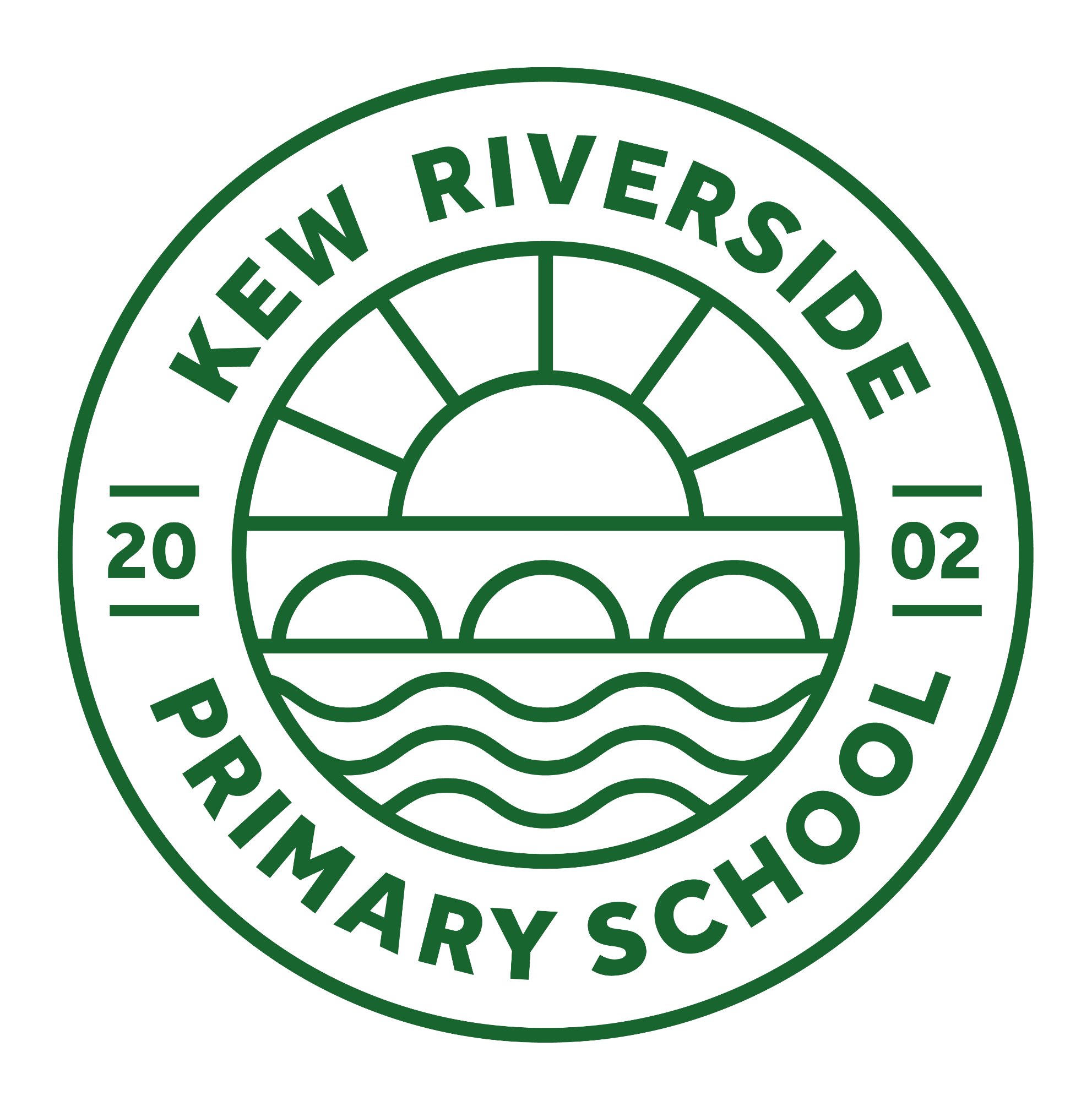History
‘“A people without the knowledge of their past history, origin and culture is like a tree without roots.”’ Marcus Garvey.
We want our children to acquire a natural thirst for knowledge about the world around them and what better way to ignite that passion than through the teaching of History. Kew Riverside Primary School itself is situated in an inspiring and diverse locality, a mere eight miles from central London. Our History curriculum makes full use of the immediate and wider local area, enabling children to develop a rich understanding of the history around them. From Reception to Year 6, the children are immersed in thoughtfully chosen topics which are central to a key question; questions we encourage the children to create in their historical enquiries in order to stimulate their curiosity in the world, people and events of the past. . We pride ourselves on providing cross curricular learning that help reinforce our children’s knowledge and lets them apply it in different subjects.
History enables children to develop a context for their growing sense of identity and a chronological framework for their knowledge of significant events and people. Through investigating and interpreting the past of carefully selected events and people, we want our children to build a sound knowledge and understanding of the history of our local community, Britain and the Wider World. We strive for our children to make comparisons between then and now and apply their knowledge and understanding to draw on how the past influences the present. We are acutely aware that what our children learn through history can influence their decisions about personal choices, attitudes and values. As a School with we make links our school and British Values, holding thoughtful and careful discussions about the impact ours and others history has on our world and wellbeing of children. This enables our children to learn to value their own and other people’s cultures in modern multicultural Britain.
Our inclusive History curriculum reflects and celebrates the diverse world we live in. We want all our pupils to share, celebrate and understand the impact of all heritages and cultures because we want to eventually live in a world where all legacies are celebrated.
‘“History has shown us that courage can be contagious, and hope can take on a life of its own.”’ Michelle Obama.
Our History curriculum has been designed to cover all of the skills, knowledge and understanding as set out in the National Curriculum. The National Curriculum states that ‘a high-quality history education will help pupils gain a coherent knowledge and understanding of Britain’s past and that of the wider world. It should inspire pupils’ curiosity to know more about the past.’
In line with the National Curriculum, at Kew Riverside, our History curriculum aims to ensure that all pupils have opportunities to;
- know and understand the history of these islands as a coherent, chronological narrative, from the earliest times to the present day: how people’s lives have shaped this nation and how Britain has influenced and been influenced by the wider world
- know and understand significant aspects of the history of the wider world: the nature of ancient civilisations; the expansion and dissolution of empires; characteristic features of past non-European societies; achievements and follies of mankind
- gain and deploy a historically grounded understanding of abstract terms such as ‘empire’, ‘civilisation’, ‘parliament’ and ‘peasantry’
- understand historical concepts such as continuity and change, cause and consequence, similarity, difference and significance, and use them to make connections, draw contrasts, analyse trends, frame historically-valid questions and create their own structured accounts, including written narratives and analyses
- understand the methods of historical enquiry, including how evidence is used rigorously to make historical claims, and discern how and why contrasting arguments and interpretations of the past have been constructed History – key stages 1 and 2
- gain historical perspective by placing their growing knowledge into different contexts, understanding the connections between local, regional, national and international history; between cultural, economic, military, political, religious and social history; and between short- and long-term timescales.
We have mapped out our History learning journey for all our children to ensure they learn a wide range of Historical events and people.

The chronology of all our teaching within History is shown below:

Our History Skills progression document below shows the skills the children will learn in their History journey at school.
As part of our History Curriculum, we provide our children with knowledge organisers to support learn and retain key knowledge and facts in history. See a sample of these below:
